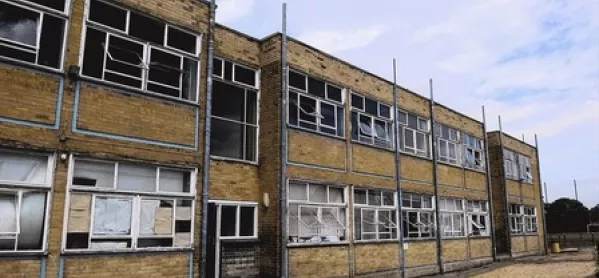- Home
- ‘Crumbling schools aren’t the exception’
‘Crumbling schools aren’t the exception’

It’s been a year since I decided to teach, but only this autumn am I visiting a variety of schools. A flurry of temporary TA job applications and Schools Direct visits means I’m being shown round a fair few primaries in the London area, often by their enthusiastic pupils. I’ve therefore seen more schools than most, bar your Ofsted inspector or assiduous Tes reporter.
Some of what I have seen has shocked and saddened me, since most of the schools I had been in before were reasonably new, although built to what might be termed "PFI-brutalist" specifications (lots of primary coloured cladding to disguise the overall blockish design). When Tes started its ‘Our Crumbling Schools’ campaign, it therefore struck a chord and the stats it revealed are heartbreaking.
One school I went to was scheduled for demolition three years ago. There are still no plans in place to commence the work, although it takes no longer than a five-minute wait in reception to see that the job needs to start now. It is about two miles from the Palace of Westminster. Stained carpet tiles in drab colours are counterpointed with painted breeze blocks along the corridors. All the offices are windowless cells, as were the two assembly/dining halls. The children’s pictures and sculptures somehow only added to the overall sadness of the scene. I commend their spirit and that of the entire staff, but condemn the fact that teaching has to happen in a place like this at all.
Schools falling to pieces
I thought that was an exception. Not so: another school was in a similar state. Here a torn bit of black fabric hung under a window light in place of a proper blind to protect from the sun. Again the breeze blocks and again the feeling that everyone deserves better than this. The good news here was that a new building is nearing completion up the road. Construction has overrun; the children were due in this term and spoke excitedly to me about it happening next term. In fact, the real "overrun" is the fact that the existing building has been in use for the past five years, let alone this term. That overrun is almost a child’s entire career in the school.
Then there are differences in equipment. In one newly built school there is a bank of iPads in their chargers in every classroom (tablet monitors proudly dish them out on a daily basis). Children are taught how to search safely for the facts they require to complete a task. Another school, a mile away, in the same London borough, and no visible tablets. There is a PC room and tablets are shared between classes; the children told me they use them "sometimes".
That school’s Victorian building, housing key stage 2 classes, is a joy since the old rooms are so tall that they invite grandiose schemes of decor, be it a Hogwarts corner that reaches to the ceiling or an art room that is a riot of colour and creativity. My young tour guides literally ran into it with glee. A cold concrete corridor lit with fluorescent lights leads to the 1960s era early years and KS1 classrooms and, while not in as parlous a state as some I have described, to me and I would imagine most visitors, they are soulless and cold underneath the pupils' works of art.
"In our time it is desirable to extend the process of education, at least in school hours, by the adoption of good and tasteful designs as well as first class workmanship." So wrote Edward Robert Robson, the architect responsible for some 400 Board Schools in London, following the landmark 1870 Elementary Education Act. Such designs in school buildings, he continued, "will not be without due fruit in further years and, in the present, will assist in promoting a love for the school". As we approach the 150th anniversary of that Act, we would do well to pay attention and honour those words.
I, for one, would rather help to "shape a life" in one of the schools I have described, but then I would far rather I didn’t have that choice to make.
David Hall is applying to become a teacher following 25 years working in communications. He tweets @campdavid
Keep reading for just £1 per month
You've reached your limit of free articles this month. Subscribe for £1 per month for three months and get:
- Unlimited access to all Tes magazine content
- Exclusive subscriber-only stories
- Award-winning email newsletters



